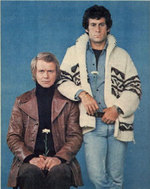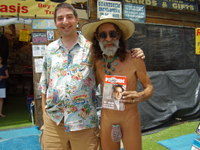I returned from Cologne late last night. It was a great experience working with the German writer/producers and it looks like I may be going back soon to continue what I started.
On the 7 1/2 hour flight from Dusseldorf to LA, I worked for a bit on DM #8, which is due this week, and watched BASIC INSTINCT 2, which was a horrendeous piece of shit (except for the production design, which was great. You know an erotic movie is bad when you’re appreciating the locations and sets and not the people who are fucking).
On my flight from NY to LA, I sat across from a gregarious and very friendly rap star named Flavor Flave or Flave Flavor or Flaky Flavor. I don’t know, I’m all jet-lagged and out-of-it today. He wore a wall clock around his neck, which I thought was odd and rather uncomfortable (and he had spares in his carry-on bag). But he was a nice guy and seemed to have boundless energy.
Next to me was a Hassidic Jew who wore the big, heavy black overcoat, the hat, the whole thing…he smelled like ten men’s locker rooms. He was pleasant, but isn’t there such a thing as Kosher deodorant?
Behind me, was this young girl, in her late teens or early 20s. At one point in the flight, she took out a fancy camera from her bag and began scrolling through some pictures. The man next to her, who was perhaps in his late 40s or early 50s, asked if she was a photographer. She said she was an aspiring one, and that she’d just spent a few weeks in Paris taking pictures, and that she’d interned at some newspaper or magazine, the name of which I didn’t catch. He then introduced himself — I didn’t get his name, but apparently he’s some famous photographer for magazines like Esquire, Vanity Fair, etc. She knew who he was, of course, and nearly wet herself in surprise. So for the next six hours, this kind man gave her a tutorial in photography, answering her questions, showing her examples, reviewing her photos, and giving her advice in a very professorial sort of way (he mentioned at one point that he’s taught before).
I didn’t understand all the stuff they were talking about, but I certainly picked up on her excitement at this opportunity and her respect for the man she was seated with. I tried to imagine what it must have been like for that girl. It would be as if I was 18 or 19, got on a plane and happened to be seated next to Larry McMurtry or Stephen J. Cannell. Of course, this sort of thing is far more likely to happen in First Class than coach.
At the end of the flight, she thanked him, saying that never in her wildest dreams did she think she’d ever meet him. He said it must have been meant to happen, gave her his card and wished her luck in her career. I thought it was great. I only eavesdropped on the whole thing, but I felt her excitement and I was struck by how attentive and nice the man was (there was no hint of hitting on her or anything like that, by the way. He was very fatherly and polite).
Tonight, I have my class at UCLA and a mountain of mail to catch up on… not to mention a book to finish writing!









